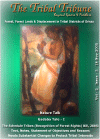Nature Talk
|
Tribals form a non-ignorable part of the Indian population is evident from the different provisions of the Indian Constitution and rules made thereunder. Article 46 of the Constitution is an expression of the State’s objective to promote their educational and economic interests and to protect them from social injustice and all forms of exploitations. Their areas of habitation are divided between 5th and 6th Schedules under Article 244 of the Constitution. In the 6th Schedule areas (of Assam, Meghalava, Tripura and Mizoram), an elective body of Autonomous District Council (ADC) with executive, and legislative and judicial powers is provided. It is empowered to make laws on land, forest, water, village or town administration, marriage and divorce, inheritance of property, social customs etc. It is also empowered to decide whether an Act made by the Parliament or State Legislatures can be applied to the Council area or not. It is also empowered to set up Courts to administer justice within its jurisdiction. Indeed an institutional provision for Self-rule by tribals! For the 5th Schedule areas (of Andhra Pradesh, Orissa, Jharkhand, Chhatisgarh, Madhya Pradesh, Maharastra, Gujrat, Rajsthan and Himachal Pradesh), the Governor is vested with special powers to exclude any Act of Parliament or of the State Legislature to the Scheduled areas by notification or extend them with such exceptions or modifications which he thinks necessary for peace or good governance. The Governor can issue notification repealing or amending any Act of Parliament or of the State Legislature or any existing law if he thinks that these Acts/laws are detrimental to the interest of the tribals. It is also provided that there would Council named Tribal Advisory Council (TAG) consisting of elected leaders to advise the Governor on matters pertaining to the welfare and advancement of Scheduled tribes. It is of course another matter that scarcely any Governor has used this power. The 6th Schedule areas, undoubtedly, are better placed than 5th Schedule areas vis-a-vis self rule by the tribals. With the Panchayats Extension to Scheduled Areas (PESA) Act 1996, however, the traditional community right of the tribals over local natural resources is recognised and the validity of 'customary law, social and religious practices and traditional management practices of community resources' is accepted while State governments are restrained from making any law which is not consistent with the customary laws of tribals. Within this, wide-ranging powers are given to Grama Sabhas. But even in this apparently progressive law is implicit the reluctance to give Gram Sabha the decisive power on the matters of land acquisition, resettlement and rehabilitation. PESA Act, 1996, which came into being on the basis of recommendation by the Bhuria Committee, however, does not include Committee's recommendation for the consent of the Gram Sabha before land acquisition, resettlement and rehabilitation; the Act merely provided for consultation with the Gram Sabha. Further the State Acts like Orissa Gram Panchayat (Amendment) Act 1997, Orissa Panchayat Samiti (Amendment) Act 1997, Orissa Zilla Parishad (Amendment) Act 1997, claimed to have been enacted following PESA Act, 1996 have considerably diluted the original provision for protection of traditional rights and customs of tribal people, their cultural identity and community control over resources, when such State Acts require such protection to be consistent with the relevant laws in force and in harmony with the basic tenets of the Constitution and human rights, which suggest that the CrPC, IPC,Forest Acts etc. shall! prevail over the customary laws of the community. Unlike the requirement of consultation with the Gram Sabha or the Panchayat before land acquisition etc. or mandatory requirement of its recommendation prior to grant of prospecting license or mining lease etc. emphasised in PESA Act 1996, Orissa Zilla Parishad (Amendment) Act 1997, confers this right to Zilla Parishad in exclusion to the Gram Sabha or Panchayat. Similarly Jharkhand Panchayati Raj Act 2001 (with amendment in 2003), has come under criticism as it lacks ' many empowering features of PESA Act 1996, like ownership of minor forest oroduce, the power to recommend licenses/ leases or regulation of liquor sales' and worse still ' the State government can take away or change the powers of Gram sabha'. Though the Jharkhand Panchayati Raj Act - 2001 is claimed to be based on PESA Act 1996, which recognises 'customary law, social and religious practices and traditional management practices of community resources', it fails, it is alleged, to deal with the laws relating .to the Customs and practices codified in Chhotnagpur Tenancy Act 1908 (CNTA) and Santhal Praganas Tenancy Act 1949 (SPTA). Such State Acts reveal the ruling elite's reluctance to allow the tribal grass root people any opportunity of self-rule. Even whatever is provided in the Acts as apology of self-rule is either ignored or violated brazenly in the field. There are instances when the Gram Sabhas constituted by the villagers following PESA Act 1996 have been refused government registration. The allegations of stage-managed Gram Sabhas are also heard. In nutshell, it can be said that the attempts by the government made through the laws are hardly effective in empowering the tribals for genuine self-rule. It appears as if within the present Constitutional framework it is possible to provide the opportunity of self-rule but for the ruling elite. But when the preying eyes of rich, cutting across the national boundaries, is on the natural resources where live the indigenous communities, natural tendency of the rich would be to alienate them from their habitat. Various strategies are devised in this direction. Since in the present predatory economic regime, alienation would be more severe, every proposal relating to tribals like the Scheduled Tribes (Recognition of Forest Rights) Bill 2005, needs careful scrutiny. The appearance of progressive could be deceptive. Until and unless the indigenous communities have final say on their means of livelihood, their language, their culture are bound to remain under threat. It remains to be seen when these communities would achieve this stage.
|
Photographs :
References :



